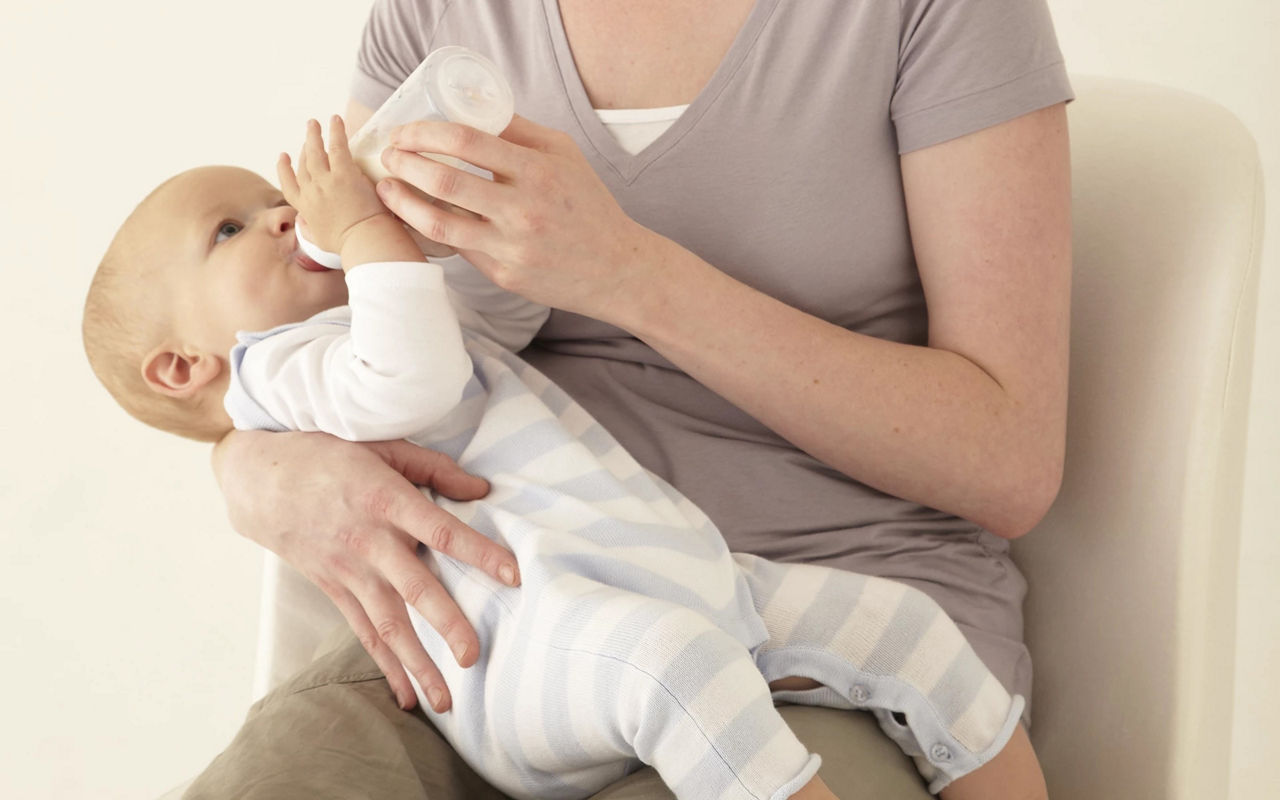- Make up each feed as required
- For hygiene reasons, do not store made up feeds and discard unfinished feeds as soon as possible, and always within 2 hours
- Do not heat feeds in a microwave, hot spots may occur and cause scalding
- Never add extra scoops or anything else to your baby’s feed
- Never leave your baby alone during feeding
Bottle Preparation
How to prepare Aptamil Hungry Infant Milk

How to prepare a bottlefeed
Our expert team are here to help.
Watch our guide on how to prepare a bottle correctly
- The Careline team
Important feeding instructions
Because powdered milks are not sterile, failure to follow instructions may make your baby ill.
| Approx. age | Approx. weight | No. of feeds per 24 hours | No. of level scoops per feed (1 scoop = 4.7g) | Single feed | ||
| kg | lb | ml | fl oz | |||
| Up to 2 weeks | 3.5 | 7³/⁴ | 6 | 3 | 90 | 3 |
| 2 - 4 weeks | 3.9 | 8¹/² | 5 | 4 | 120 | 4 |
| 4 - 8 weeks | 4.7 | 10¹/² | 5 | 5 | 150 | 5 |
| 8 - 12 weeks | 5.4 | 12 | 5 | 6 | 180 | 6 |
| 3 - 4 months | 6.2 | 13³/⁴ | 5 | 6 | 180 | 6 |
| 4 - 5 months | 6.9 | 15¹/⁴ | 5 | 7 | 210 | 7 |
| 5 - 6 months | 7.6 | 16³/⁴ | 5 | 7 | 210 | 7 |
| 7-12 months | - | - | 3 | 7 | 210 | 7 |
It’s important to be careful with the water you use to prepare a formula feed if your normal drinking water supply is either interrupted or contaminated. Follow these Food Standards Agency guidelines to make sure you prepare the baby formula safely.
Step 1
Use bottled water or water from a bowser (a water tank provided by water companies) and bring it to a rolling boil. Leave it covered to cool for no more than half an hour.
Step 2
If there’s no electricity or gas to boil with, bottled table, spring or mineral water can be used and the prepared feed should be used immediately. The use of unboiled bowser water should be avoided.
Step 3
Some bottled water labelled as ‘natural mineral water’ may have high levels of sodium or sulphate. Read the label carefully and check that the figure for sodium (Na) is not higher than 200mg per litre and sulphate (SO or SO4) is not higher than 250mg per litre. If it is, then try to use another water. If no other water is available, then use this water for as short a time as possible.
Step 4
Follow the normal instructions for making up the feed.
Step 5
Use cooled boiled water or cooled boiled bottled water for cooling the feed once it has been made up.
Please follow these instructions carefully. Failure to follow instructions may make your baby ill.
Step 1
Wash hands and sterilise all utensils according to manufacturers’ instructions.
Step 2
Shake the bottle of Aptamil Hungry Infant Milk before opening. Using the feeding guide, pour the required amount of infant milk into a sterilised feeding bottle.
Step 3
Aptamil Hungry Infant Milk can be given at room temperature, or warmed if desired. If warmed, check temperature of feed.
Step 4
For hygiene reasons, discard unfinished milk in the feeding bottle as soon as possible, always within 2 hours.
More from our experts

Need some help?
You can get quick answers to common questions in our FAQs.
Alternatively, if you need help with general pregnancy or baby advice, or maybe on using or ordering our products - our expert team are always on hand to talk about feeding your baby.
Important notice
Breastfeeding is best for babies. Infant formula is suitable from birth when babies are not breastfed. Follow-on milk is only for babies over 6 months, as part of a mixed diet and should not be used as a breastmilk substitute before 6 months. We advise that all formula milks including the decision to start weaning should be made on the advice of a doctor, midwife, health visitor, public health nurse, dietitian, pharmacist or other professional responsible for maternal and child care, based on baby’s individual needs.
Do not use if your baby has been diagnosed with a cow's milk allergy.
Use Toddler Milk as part of a varied balanced diet from 1 year.








